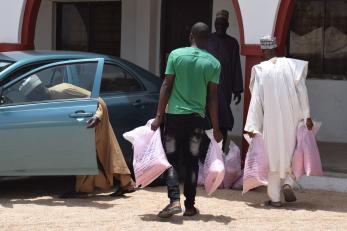How agro-input fairs are connecting smallholder farmers with product sellers
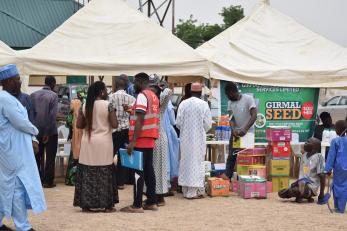
Jauro Abacha Kolere is a farmer from Mubi, who expressed pleasure in buying quality products directly from the companies at affordable prices.
“We used to see this on the TV, now they brought it to our area, to boost farming in our local area. I have several hectares of rice farms. I also farm soya beans and guinea corn. When you buy these products in the market, sometimes you buy fake products, but here, you know you are just buying directly from the company. And the prices differ. We here in the village don’t know these products, for example, the planter can be used to plant a hectare in one hour, without it, you can plant it maybe in one day.”
Like Jaura, the majority of the farmers attending the ongoing agricultural input fairs in Borno, Adamawa, Yobe, and Gombe states, supported by the USAID-funded, Feed The Future Nigeria Rural Resilience Activity have one purpose in mind – to secure agricultural inputs for the wet season, as most of them have started clearing their farmlands in preparation for planting.
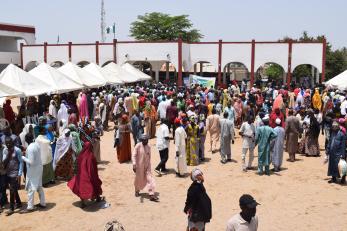
The input fairs provide the opportunity for input product sellers such as Albit & Agro Consult Limited, Deva Access, Solar Sisters, Asma'u farms, Girmal Seeds, and SeedCo Limited, and the participation of the Rural Resilience Activity, to showcase and sell the National Agricultural Seed Council (NASC) certified improved seeds, and quality agrochemicals to farmers at affordable prices.
Most smallholder farmers, especially in Northeast Nigeria, are poor and unable to invest in agric inputs on a commercial scale. Thus, while some farmers came with the intent of getting the inputs free, others took advantage of buying from input companies directly.
The input fair in Mubi is one of the agro-input exhibition fairs held between May 9 and June 2, 2022 in 10 LGAs in Borno, Adamawa, Yobe and Gombe states. The input fairs were organized by the USAID funded Feed the Future Nigeria Rural Resilience Activity and the Feed the Future Nigeria Integrated Agriculture Activity, in collaboration with the National Agricultural Seeds Council (NASC) and the Federal Ministry of Agriculture & Rural Development (FMARD).
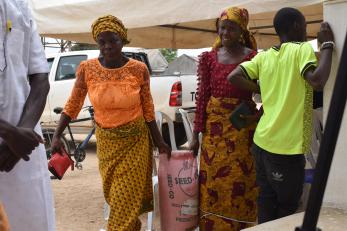
A female farmer, Rachel Sunday, who bought a 25kg bag of maize seeds, said in Hausa language, that the fair should be held every month because the price at the fair is less than what she usually gets from the market.
For Philemon Blessing, a product seller and Rural Resilience Activity-trained food processor, participating in the input fair has meant increased patronage and linkage with customers.
“Gaskiya![Truthfully] I am very grateful because all the products I bought have finished. I produce seasoning, instead of using Maggi, I have spices like curry and yaji [chii pepper]. The milk and chocolate I produce myself have also been sold out,” said Blessing.
Albit & Agro Consult Limited, a company promoting smart climate agriculture, is one of the product sellers at the Mubi input fair. Albit products on display included agric equipment like roller-push weeder, manual push-roller planter, and motorized sprayer, as well as agrochemicals like Albit organic fertilizer, in substitute of NPK fertilizer, which is currently a controlled substance in Northeast Nigeria due to security reasons.
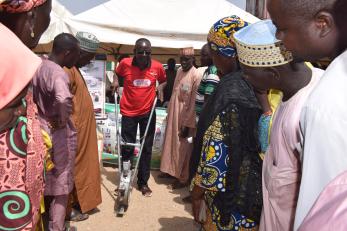
According to Dr. Yusuf Yakubu Yerima Ballah, the Executive Director, Albit & Agro Consult Limited, many of the farmers bought maize seeds and equipment in preparation for cultivation.
“I can’t exactly give the total amount yet, but we know that we had over a hundred clients that patronized the various products we displayed. The highest sales we made were in maize seeds, the farmers were actually rushing for it, followed by the Albit organic fertilizer, and then the manual roller-push planter. Some acquired the manual push-roller weeder. Nobody acquired the sprayer and just a couple of the rice seeds were acquired. Generally, the maize seeds were highly patronized.”
